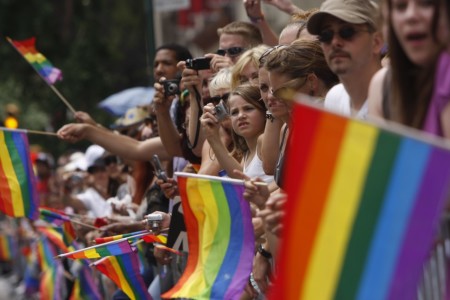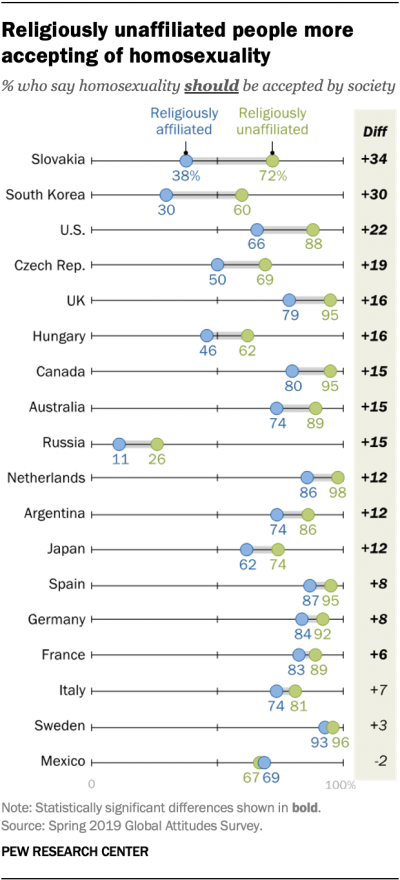Atheists, religious have similar view on homosexuality globally: Pew survey

There's not much difference between the views of religiously affiliated and religiously unaffiliated on homosexuality among over a dozen countries analyzed in a Pew Research Center survey.
The findings, which are based on the Global Attitudes Survey released this year, show the opinions on homosexuality from religious believers of all faiths and the religiously unaffiliated — defined as identifying as atheists, agnostics or saying their religion is ‘nothing in particular’ — in 18 countries around the world. In Sweden, for example, 93% of religiously affiliated and 96% of religiously unaffiliated say homosexuality should be accepted by society, only a 3% difference.
In Catholic stronghold Italy, 81% of the religiously unaffiliated say homosexuality should be accepted by society compared to 74% of religiously affiliated who think homosexuality should be accepted, only a 7% difference.

Out of the 18 countries that had samples of religiously unaffiliated surveyed by Pew, 12 countries had 15 or less percentage point difference between religiously affiliated and unaffiliated views on homosexuality. Only Slovakia (72% religiously unaffiliated versus 38% religiously affiliated), South Korea (60% unaffiliated versus 30% affiliated), U.S. (88% unaffiliated versus 66% affiliated), and Czech Republic (69% unaffiliated versus 50% affiliated) had 15 or more percentage point difference and a large difference in opinion on homosexuality.
Although the U.K. had a 16 percentage point difference, the vast majority of religiously unaffiliated (95%) and religiously affiliated (79%) think homosexuality should be accepted by society.
In all countries with data except Mexico, religious believers were less likely to think homosexuality should be accepted by society than nonbelievers did. In Mexico, surprisingly 69% of religiously affiliated say society should accept homosexuality compared to 67% of religiously unaffiliated.
“My guess is that being ‘religiously affiliated’ means something quite different in these countries to what we would generally mean by that in the United States,” said Wheaton College sociologist Brian Howell to The Christian Post.
In countries like Mexico, Italy and Sweden, many people are culturally affiliated with churches they don’t visit, Howell said. As a result, they don’t personally believe in Christian teachings on homosexuality even though they consider themselves religious.
From 2013 to 2019, acceptance of homosexuality has gone up in all but six countries surveyed: Russia, Nigeria, Indonesia, Turkey, Lebanon and South Korea. And in those six years, approval for homosexuality rose by 10% or more in India, South Africa, Turkey, Japan, the U.S. and the U.K.
Dr. Richard Land, the president of Southern Evangelical Seminary, said the worldwide trend toward acceptance of homosexuality reflects a philosophical shift in the West away from Christian ideas like absolute truth.
“In the reigning zeitgeist of the West, there are no absolute truths. If you’re a nonbeliever, you’re going along with that,” said Land, who is also CP executive editor.
Countries in the survey with low cultural attachments to Western Europe had the lowest approval of homosexuality. Among all the countries where nonbelievers were surveyed, only those in Russia were opposed to homosexuality.
Dana Ruduša, the senior communications manager for the LGBT advocacy group OutRight Action International, said that attitudes on homosexuality are changing because people who practice it are now more visible.
“It is easy to hate and fear something we don't know,” she told CP. “Once we get to know LGBTIQ people, once we learn that our friends, family members, neighbors, leaders, idols and so on are also LGBTIQ people, the myths naturally start to fall away, leading to more awareness and acceptance.”
2020 marks the first openly homosexual presidential candidate to win a presidential primary, the first homosexual character in a Disney short film, and the first openly bisexual Miss USA contestant. In only 17 years, Americans' favorable opinion of homosexuality has increased by 17%.
Americans have the third-largest divide between believer and non-Christian opinions on homosexuality, the study found. Two-thirds of religious Americans say homosexuality is acceptable, compared to almost nine out of 10 nonbelievers.
Slovakia and South Korea have the largest and second-largest divide between believers and nonbelievers, respectively.
In both the Old and New Testament, the Bible tells believers that the purpose of family is to unite one man and one woman in a loving relationship so they can “be fruitful and multiply” (Genesis 1:28).
Land also said that most Christian Americans he knows are unmoved by arguments against homosexuality based on the importance of families having children to continue society.
“The only reason that I’m against homosexuality is because the Bible is. Culture’s got nothing to do with it. The Bible clearly does not approve of same-sex behavior. The question of homosexuality is a truth serum for evangelicals in America. If you affirm monogamous same-sex relationships, you clearly have departed from a new testament epistemology and authority,” he said.
“Most Americans I know that are religious and conservative are against same-sex relationships for purely theological reasons, except Catholics," Land added. "Evangelicals don’t tie family and reproduction to theology as tightly as Catholics. Protestants agree with that, but that’s not the reason they’re opposed to homosexuality.”
In the past 60 years, many American mainline Protestant churches moved away from orthodox Christian belief, said Land. Mainline denominations that once made up 40% of American Christians now make up around 19%. Those that remain don’t see the Bible as authoritative.
“They don’t see any conflict between their faith and the modern zeitgeist,” he said. “Mainline Protestants have been overwhelmed by moral relativism.”
The study also found that among Christians worldwide, the U.S. has the most politically left-leaning Christians. Although the terms “left” and “right” often vary in meaning by culture, Howell said that the U.S. is moving leftward politically. The election of President Donald Trump doesn’t change that overall trend.
“It appears that younger people are considerably more left-leaning and that our country as a whole is moving left. Religiously affiliated people are reflecting this general trend.”






















